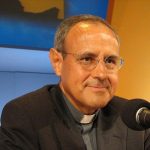Living without fear in the age of uncertainty
In collaboration with Università Cattolica del Sacro Cuore
Julián Carrón, Professor of theology at the Università Cattolica del Sacro Cuore and President of the Fraternity of Communion and Liberation; Charles Taylor, Professor Emeritus of Philosophy at McGill University, Montreal and Ratzinger prize winner in 2019; Rowan Williams, Professor Emeritus of Contemporary Christian Though at University of Cambridge and former Archbishop of Canterbury. Introduced and moderated by Monica Maggioni, Journalist.
The meeting between Charles Taylor, Julián Carrón and Rowan Williams at the Meeting 2021 aims to be an integral part of the exhibition carrying the same name. The aim is to develop a trialogue on the full content of the interviews that make up the fabric of the exhibition (the length of which has necessarily been reduced for exhibition purposes). Each one of the three speakers will be invited to take a stance and respond to the questions and challenges raised by the other two in their previous interviews and dialogues throughout the year. The main idea is to focus on the possibility of living the uncertainty of the present and the phenomenon of secularisation as a great opportunity for rediscovering, on the one hand, the nature of the self and, on the other, the originality of the Christian event. It is a far-reaching confrontation concerning the possibility of experiencing “fullness” in this secular age. The dialogue, as it has been conducted so far, has never taken on the tone of an intellectual confrontation, but it has rather represented the position of three great personalities committed to their lives and to the lives of the people of our time. It is an exploration journey in which no question relating to the human is censored: the spotlight is on reality and even the most uncomfortable questions are accepted as an indispensable factor in this human adventure. The previous dialogues with the three thinkers have shown how secularisation strongly emphasize the irreducibility of the human being. Therefore the aim is not to share evaluations to be ‘applied’ to reality, but to be wounded by the cry of human beings in this times of uncertainty, dialoguing and telling the public which are the certainties that, in different ways, help them cope with reality without any fear.













